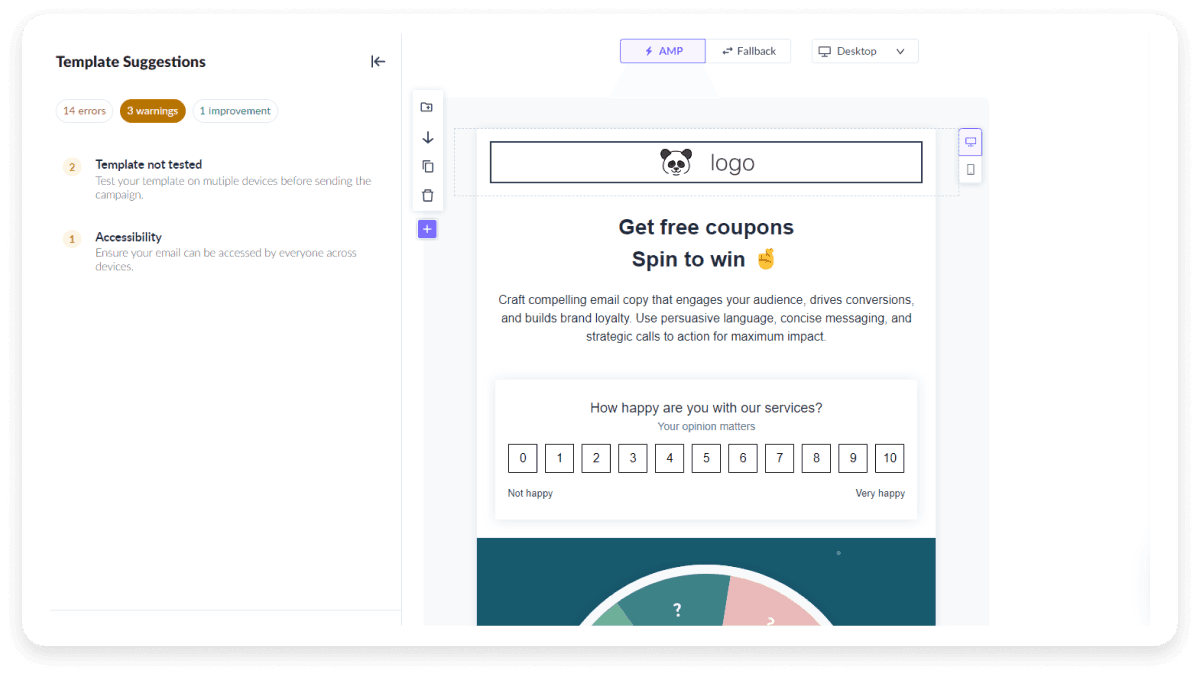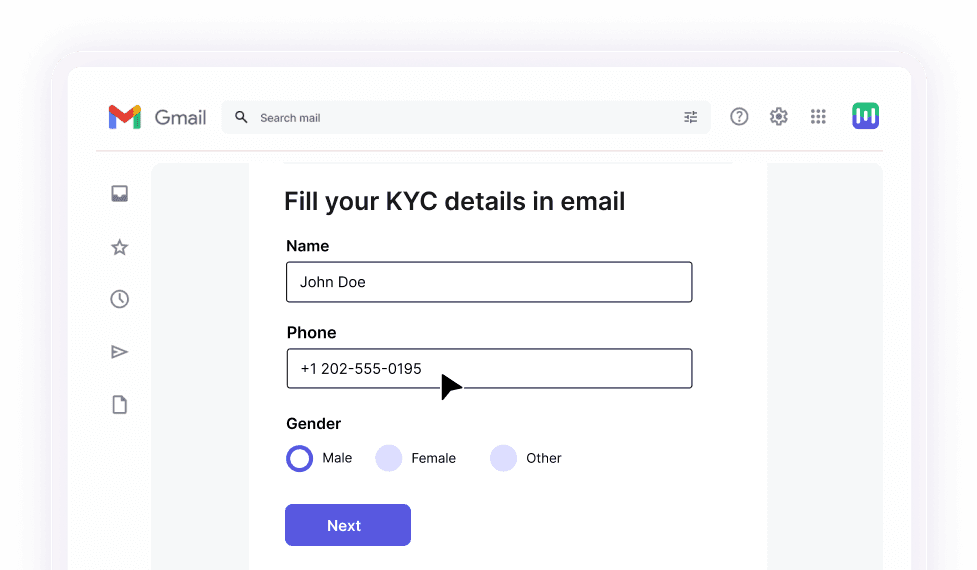What is email testing?
Email testing is the process of inspecting various aspects and elements of your email to optimize KPIs like open rates, CTRs, etc. Email testing helps you improve email deliverability, rendering, and even the quality of your subject lines and email content that resonates with your readers.
By analyzing the performance metrics of each version through email tests, such as open rates or click-through rates, you can gain insights into what resonates best with your audience. Email testing enables data-driven decision-making, helping optimize future campaigns for higher engagement and conversion rates. With regular and effective email testing, you can ensure engagement and a high email ROI.
Why should you test your emails?
Email testing allows you to compare various elements to see how each affects your subscriber's behavior. Whether a more compelling subject line can boost open rates or a differently colored CTA button can drive conversions – you can find out only by email testing.
Here's why you should test your emails:
It helps in boosting open rates and conversions.
It helps in understanding subscribers' behavior and what resonates with them.
It helps you create and send technically sound emails that are correctly displayed on all devices.
It helps you create well-designed emails with an easy-to-follow format.
It helps in improving email deliverability and other KPIs.
What should you test in an email?
There are four main elements of testing an email: content validation, campaign parameters, technical validation, and accessibility.
Content validation
This deals with testing the content, such as subject line, preheader text, CTA, and grammar.
1. Subject line: The subject line is critical to the success of your email campaign. It's the first thing your audience reads that could get them to open or ignore your email. It needs to be catchy and of value to the reader.
Types of subject lines to test for:
Short copy vs. long copy
First name personalization
Tone – informal vs. corporate
Discount vs. free value-added conveniences
Copy optimized for mobile vs. desktop or other devices
2. Preheader text: The preheader text is the content that appears beside the subject line in your mailbox. You can see the first line of text in your email right below the subject line (or beside – in the case of the desktop). It is the wingman to the subject line, providing context on what the email is all about. The preheader text can also boost your open rates. It's like the wrapping paper on the gift. It sets the mood for subscribers' expectations upon opening the mail.
Variations of preheader text to test in an email:
Include vs. exclude the preheader text altogether
Highlight different topics, especially if it's a newsletter.
Elaborate on the subject line: for example, if the subject line is a question, arouse the reader's curiosity.
3. Call to action: The CTA is usually designed to be the center of attention of each email. A CTA, or call to action, is a prompt that encourages the audience to take a specific action.
Here's what you can test in your CTA:
Generic vs. specific copy. For example, "Learn more" vs. "Get the look-book now"
The color of the CTA can inspire us to take immediate action, like red or orange.
Top vs. bottom placement of the CTA
Size of the CTA button
Different offers or promotions
4. Grammar check: Your language and punctuation matter when you are talking to your subscribers. It's unpleasant for a business or a professional to make these teeny-tiny mistakes. It is important to grammar check the email content you send many people. There are several tools, including Grammarly, that can help you curate emails that are grammatically correct and also provide suggestions on the content.
Campaign parameters
Here are some parameters you should consider while sending an email campaign:
1. Email scheduling time: Test your email scheduling time to ensure more productivity. Testing the email scheduling time helps you understand at what time of the day your audience is more inclined to click on the CTA and make a purchase instead of quickly scanning through the mail and "saving it for later".
2. Email scheduling day: Test the email scheduling days to see the change in your open rates and CTRs. Email scheduling days and times must be tested regularly to find the sweet spot of the highest open rates and CTRs. There's no correct answer, as it may change from season to season, business to business, and place to place.
Read how our client, Project Pro, achieved 3X open rates by improving their email deliverability.
3. Deliverability: Deliverability issues can be those silent troublemakers that hinder the connection between you and your subscribers. To not waste your time and effort, ensure your email delivery is top-notch. Here, you can check these parameters:
Tools like Sender Score can help you boost your deliverability rate. It comes with a free trial.
Technical validation
Aspects like design and layout, HTML and CSS, Font, links, and images are tested here.
1. Design and layout: The viewing experience is key to getting more conversions. The email design and layout can determine whether the subscriber will scroll down and click on the CTA. Test the design and layout of your emails regularly to improve the viewing experience and CTRs. Use A/B testing on your email service provider for this.
2. HTML and CSS validation: Factors like ESPs, operating systems, screen sizes, images, apps, and web-based email clients affect email rendering and functionality. Each email contains some HTML code, which can be displayed differently on various devices for the above reasons. Make sure to do this email validation to make your emails relevant and valuable to your subscribers.
3. Content formatting: To ensure a positive viewing experience and reduce the risk of unsubscribes, it's essential to validate that your email content is well-formatted and free from missing images. Implementing responsive design will help ensure that your emails display properly across various devices. Additionally, using clear fonts and avoiding broken links are crucial for maintaining readability and functionality.
You can use the email testing feature by Litmus to ensure your email formatting is correct and good to go.
Accessibility
Email accessibility is the practice of ensuring that your emails can be read and understood even by subscribers who are disabled. Email accessibility checks also become relevant when certain portions of the email become inaccessible due to technical compatibility issues.
You can check the accessibility of your email by following these parameters:
1. Alt texts: Include descriptive alt text for images to convey their meaning to individuals who use screen readers. Avoid using images with critical information that is not available in text form.
2. Color contrast: Check the color contrast of text against background colors to ensure readability. Use tools like WCAG that analyze color contrast and adhere to accessibility guidelines.
3. Font size and style: Set a readable font size, and avoid using small fonts. Ensure there is sufficient line spacing, and choose easily readable fonts.
4. Keyboard navigation: Navigate through the email using only your keyboard to ensure that all the interactive elements are accessible.
5. Accessible links: Use descriptive link text that provides context about the linked content. Ensure links are visually distinguishable and have a focus state for keyboard navigation.
How to improve your email testing
There are many ways in which you can improve your email testing. Some of the main ones are listed below:
1. Know what you're testing and why
Email testing is pointless without a goal. Use a statement template like "Changing from point A to achieve point B" or develop a comprehensive checklist that covers all critical elements of email marketing campaigns, including design, content, links, personalization, and deliverability.
2. Test across various email clients
Ensure your emails are responsive and render well everywhere, including desktop and mobile devices. Also, test across different email clients. Some popular email clients include Gmail, Outlook, Apple Mail, Android, and iOS, which you can test to catch any rendering issues.
2. Test one element at a time
If you test more than one aspect of your email at a time, you won't be able to determine which variant drove the success. Be patient and test one thing at a time to gain quality assurance.
3. Avoid testing large groups
Testing smaller groups gives you a clear winner, which can be incorporated into your larger mailing list.
4. Maintain a testing schedule
Run tests on the same day of the week, at the same time. This helps avoid the timing variant affecting your results. Also, periodically review and update your testing processes to incorporate new techniques and technologies.
Send error-free emails with Mailmodo
Wondering how can you implement these small email testing parameters and send error-free emails? Mailmodo's smart template suggestion tool can help you do that very easily. It provides you with alerts on what errors your email might have before sending the email and also provides you with actionable suggestions that you can execute at the same time to make your emails readable and accessible and improve email design and UX. Say goodbye to manual testing and welcome smart email template suggestions!

Create and send error-free emails in minutes






































